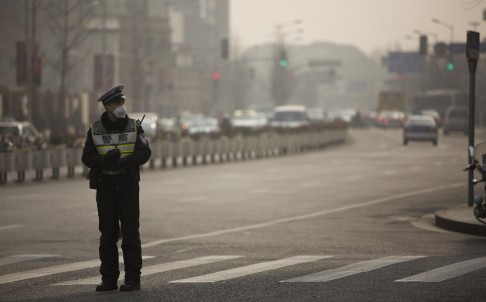That is nothing compared to the 1.2 million deaths a year from pollution in China. ANd you think this Indonesian "haze" will not affect us in the long run?
BEIJING — Outdoor air pollution contributed to 1.2 million premature deaths in China in 2010, nearly 40 percent of the global total, according to a new summary of data from a scientific study on leading causes of death worldwide.
Figured another way, the researchers said, China’s toll from pollution was the loss of 25 million healthy years of life from the population.
The data on which the analysis is based was first presented in the ambitious 2010 Global Burden of Disease Study, which was published in December in The Lancet, a British medical journal. The authors decided to break out numbers for specific countries and present the findings at international conferences. The China statistics were offered at a forum in Beijing on Sunday.
“We have been rolling out the India- and China-specific numbers, as they speak more directly to national leaders than regional numbers,” said Robert O’Keefe, the vice president of the Health Effects Institute, a research organization that is helping to present the study. The organization is partly financed by the United States Environmental Protection Agency and the global motor vehicle industry.
What the researchers called “ambient particulate matter pollution” was the fourth-leading risk factor for deaths in China in 2010, behind dietary risks, high blood pressure and smoking. Air pollution ranked seventh on the worldwide list of risk factors, contributing to 3.2 million deaths in 2010.
By comparison with China, India, which also has densely populated cities grappling with similar levels of pollution, had 620,000 premature deaths in 2010 because of outdoor air pollution, the study found. That was deemed to be the sixth most common killer in South Asia.
The study was led by an institute at the University of Washington and several partner universities and institutions, including the World Health Organization.
Calculations of premature deaths because of outdoor air pollution are politically threatening in the eyes of some Chinese officials. According to news reports, Chinese officials cut out sections of a 2007 report called “Cost of Pollution in China” that discussed premature deaths. The report’s authors had concluded that 350,000 to 400,000 people die prematurely in China each year because of outdoor air pollution. The study was done by the World Bank in cooperation with the Chinese State Environmental Protection Administration, the precursor to the Ministry of Environmental Protection.
There have been other estimates of premature deaths because of air pollution. In 2011, the World Health Organization estimated that there were 1.3 million premature deaths in cities worldwide because of outdoor air pollution.
Last month, the Organization for Economic Cooperation and Development, based in Paris, warned that “urban air pollution is set to become the top environmental cause of mortality worldwide by 2050, ahead of dirty water and lack of sanitation.” It estimated that up to 3.6 million people could end up dying prematurely from air pollution each year, mostly in China and India.
There has been growing outrage in Chinese cities over what many say are untenable levels of air pollution. Cities across the north hit record levels in January, and official Chinese newspapers ran front-page articles on the surge — what some foreigners call the “airpocalypse” — despite earlier limits on such discussion by propaganda officials.
In February, the State Council, China’s cabinet, announced a timeline for introducing new fuel standards, but state-owned oil and power companies are known to block or ignore environmental policies to save on costs.
A study released on Thursday said the growth rate of disclosure of pollution information in 113 Chinese cities had slowed. The groups doing the study, the Institute of Public and Environmental Affairs, based in Beijing, and the Natural Resources Defense Council, based in Washington, said that “faced with the current situation of severe air, water and soil pollution, we must make changes to pollution source information disclosure so that information is no longer patchy, out of date and difficult to obtain.”
Chinese officials have made some progress in disclosing crucial air pollution statistics. Official news reports have said 74 cities are now required to release data on levels of particulate matter 2.5 micrometers in diameter or smaller, which penetrate the body’s tissues most deeply. For years, Chinese officials had been collecting the data but refusing to release it, until they came under pressure from Chinese who saw that the United States Embassy in Beijing was measuring the levels hourly and posting the data in a Twitter feed, @BeijingAir.
Last week, an official Chinese news report said the cost of environmental degradation in China was about $230 billion in 2010, or 3.5 percent of the gross domestic product. The estimate, said to be partial, came from a research institute under the Ministry of Environmental Protection, and was three times the amount in 2004, in local currency terms. It was unclear to what extent those numbers took into account the costs of health care and premature deaths because of pollution.



